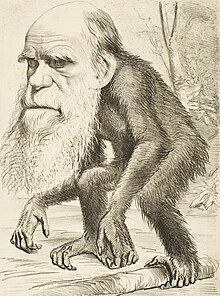Viktoriatida
- Alle sitat frå viktoriatida
- Viktoriatida på Nynorsk Wikipedia.

Viktoriatida viser til tida dronning Victoria herska over det verdsomspennande britiske riket, frå 1837 til 1901.
Sitat frå viktoriatida
[endre]Kjelde:Life and Letters of Thomas Henry Huxley F.R.S (bok) (tale)
Opphavleg mål: Engelsk
År: 1860
Periode: Viktoriatida
Kontekst: Éin versjon av eit berømt svar Huxley kom med til biskop Samuel Wilberforce, som under ein debatt om evolusjonslæra sarkastisk hadde spurt om han stamma frå ein ape på bestemor- eller bestefarsida. "whether he was descended from an ape on his grandmother's side or his grandfather's" (30 June 1860), Life and Letters of Thomas Henry Huxley F.R.S (1900) edited by Leonard Huxley.
Møtet blei ikkje stenografert, og svaret til Huxley finst i ei rekkje ulike utformingar i dagbøker og memoar.
Andre versjonar:
- I would rather be the offspring of two apes than be a man and afraid to face the truth.
- Life and Letters of Thomas Henry Huxley F.R.S (1900), redigert av Leonard Huxley.
- If the question is put to me would I rather have a miserable ape for a grandfather or a man highly endowed by nature and possessed of great means of influence and yet who employs these faculties and that influence for the mere purpose of introducing ridicule into a grave scientific discussion, I unhesitatingly affirm my preference for the ape.
- Harvest of a Quiet Eye (1977) av Alan L. Mackay.
- The Bishop rose, and in a light scoffing tone, florid and he assured us there was nothing in the idea of evolution; rock-pigeons were what rock-pigeons had always been. Then, turning to his antagonist with a smiling insolence, he begged to know, was it through his grandfather or his grandmother that he claimed his descent from a monkey? On this Mr Huxley slowly and deliberately arose. A slight tall figure stern and pale, very quiet and very grave, he stood before us, and spoke those tremendous words — words which no one seems sure of now, nor I think, could remember just after they were spoken, for their meaning took away our breath, though it left us in no doubt as to what it was. He was not ashamed to have a monkey for his ancestor; but he would be ashamed to be connected with a man who used great gifts to obscure the truth. No one doubted his meaning and the effect was tremendous. One lady fainted and had to carried out: I, for one, jumped out of my seat; and when in the evening we met at Dr Daubeney's, every one was eager to congratulate the hero of the day.
- Mrs. Isabella Sidgwick in "A Grandmother's Tales"; Macmillan's Magazine LXXVIII, No. 468 (October 1898)
- Mrs. Isabella Sidgwick in "A Grandmother's Tales"; Macmillan's Magazine LXXVIII, No. 468 (October 1898)
| evolusjon besteforeldre avstamming menneske apar |
skam slektskap |


«Ein mann har ingen grunn til å skamma seg over å ha ein ape som bestefar.» Thomas Henry Huxley
task this Proprietor has set me, has been never to leave off conjugating the Imperative Mood Present Tense of the verb To keep always at it. Keep thou always at it. Let him keep always at it. Keep we or do we keep always at it. Keep ye or do ye or you keep always at it. Let them keep always at it. Here is your benevolent
Patriarch of a Casby, and there is his golden rule.»gjennom Mr. Pancks
Kjelde:Little Dorrit (roman)
Kapittel 32
Opphavleg mål: Engelsk
År: 1856
Periode: Viktoriatida
| arbeid framhald levereglar patriarkar sjefar |

«Hald stendig fram. Her har de den vennlegsinna partiarken av ein Casby, og der er den gylne regelen hans.» Charles Dickens
Kjelde:Notes on the General Principles of Employment for the Destitute and Criminal Classes (bok)
År: 1868
Periode: Viktoriatida
| kriminalitet straff verkemiddel hindringar den lovgjevande makta |

«Straff er det siste og minst effektive instrumentet i handet til lovgjevaren for å hindra kriminalitet.» John Ruskin
